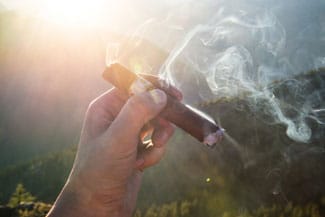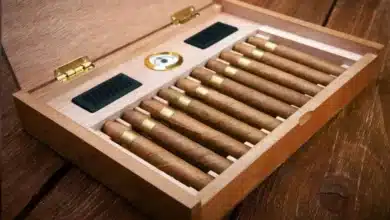Why Are Cuban Cigars Illegal In The U.S.?
Smoking tobacco has long been part of Cuba’s history, with the tradition dating back to before Christopher Columbus arrived in the area!

Today, that tradition has evolved into Cuban cigars, which are famous the world over. The problem is, if you’re into smoking Cuban cigars and live in the US, you know that Cuban cigars are illegal.
So, why are Cuban cigars illegal? Good question! Let’s take a look at what to know about Cuban cigars and their legalities in the US.
Why Are Cuban Cigars Illegal In The United States?
Cuban cigars are illegal thanks to the Cuban US trade embargo that’s been in place since 1962.
Now, many people wonder why did John F. Kennedy (President of the United States at the time) ban Cuban cigars?
JFK originally set up the embargo between Cuba and the US to help limit the growing power of Fidel Castro’s communist government on the island nation.
The US Cuban embargo didn’t just limit cigars, either. It limited a whole lot of other things including American travel to Cuba.
The idea was that by limiting the trade and tourism from the US to Cuba, Castro would not be able to support his communist regime. This would lead to severe impacts on the Cuban economy.
Are Cuban Cigars Legal In 2022?
Interestingly enough, a few years ago under the Obama administration, the embargo between the US and Cuba was loosened. During this time, you could have brought Cuban cigars back from your vacation (and spoiler, I did!). Unfortunately I only have a handful left in my humidor.
However, all that changed when President Trump took office. In 2020, Trump once again tightened trade restrictions between the US and Cuba.
As a result, importing Cuban cigars is once again illegal. This was a big blow for many of the smokers out there who were looking forward to Cuba’s hand-rolled cigars! However, if you are able to secure a reason to travel to Cuba (or another country that has Cuban cigars, it is legal to smoke and enjoy them in that country).
Is It Illegal to Own Cuban Cigars?
Okay, so you know that Cuban cigars are illegal. However, what if you own one?
Let’s say you somehow got your hands on one and now have it sitting in your house. Will you get in trouble for it?
Interestingly enough, it’s not illegal to own Cuban cigars. However, it is illegal for US citizens to buy or sell Cuban cigars.
That’s not to say that you might not get given one as a gift. Just make sure that you’re able to prove that you didn’t purchase it yourself.
Is It Illegal to Import Cuban Cigars?
Now that you know it’s legal to own a Cuban cigar, you might start thinking about how you get your hands on one. If you’re in this boat, maybe it’s a good time to realize that Cuban cigars aren’t considered by aficionados to be the world’s best cigars anymore.
For me, on my trip to Cuba, meeting a local farmer and enjoying a hand rolled Cuban was my finest cigar moment. But a lot of that was the experience. Some of the world’s most award winning smokes stem from countries like Nicaragua, Honduras, the Dominican Republic, etc.
What Happens If You Get Caught With A Cuban Cigar?
We’ve mentioned that importing Cuban cigars is illegal. But, if for some reason or another you decide to import them, make sure that you know you’re running some serious risks.
Importing Cuban cigars is a criminal offense. That means that it’s a much more serious crime than, say, forgetting to pay a parking ticket.
If you get caught trying to sneak Cuban cigars into the US, regardless of what the reason behind doing so is, you could face fines of as much as $50,000. According to the law, you could also be taken to criminal court (meaning you could end up in prison). While the likelihood of that may seem slim (and may in fact be), ask yourself if it’s worth the risk.
Can I Buy Cuban Cigars Online?
The short answer is yes, it is possible to buy Cuban cigars online. But there’s a few things to take note of:
- The legal implications already described above
- Pricing will be significantly higher than you’ll pay for a Cuban bought within Cuba or another country that offers them
- With the demand for Cuban cigars high, there are plenty of scammers trying to take advantage of you. I.e. what you may end up shelling your hard earned dollars out for may not actually be a Cuban, despite what the band on the cigar says. Cuban fakes are prolific in the market, particularly for popular brands such as Cohiba, Monte Cristo, and others.
What’s The Best Place To Buy Cigars?
As a rule of thumb, I always prefer to support my local establishments. Ask around and you’ll find there is probably a local cigar shop in your area. You can chat about your likes and dislikes in person and they can help you narrow in on a smoke you’ll enjoy.
The other option is to buy cigars online, but make sure you select a reputable provider. It’s important your cigars stay humidified before and during transit to you. There are also monthly subscriptions available where some of the world’s finest cigars are hand-picked for your enjoyment.





I heard that Biden recently relaxed the U.S. restrictions on Cuba again (similar to what the Obama administration did) following Trump’s re-tightening of restrictions in the last administration. Any idea how this affects Cuban cigar legality?